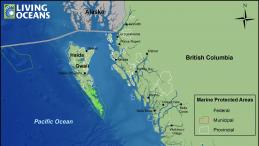Federal government not meeting ocean protection commitments
VANCOUVER—A report released today by the Commissioner of the Environment and Sustainable Development supports Living Oceans Society’s contention that the federal government is failing to live up to its international commitments on effective marine protected areas (MPAs) and has left taxpayers exposed to enormous liabilities for oil spills in Canada’s oceans. The report responds to a petition filed by Living Oceans.
“Canada is not living up to its international commitment to build a network of MPAs by 2020, in which at least 10 percent of each ecological region is effectively conserved,” says Kim Wright, Living Oceans’ Marine Planning Director. “The Auditor General’s report is in line with the results of research we have conducted on Canada’s Pacific coast that show that less than one percent are protected through no-take MPAs that are closed to commercial fishing.”
The Auditor General recognizes that there are both ecological and economic benefits to be gained from effective networks of MPAs, and that the health of the ocean is in serious decline. Fisheries and Oceans Canada (DFO) response to the Auditor General’s criticism that a national plan for achieving protection targets is incomplete stated that “developing and implementing such a national plan will take decades under current funding levels.” This is not good enough.
“The federal government needs to take a leadership role as per its commitments under the Oceans Act and must also ensure that DFO puts the appropriate fishing closures in place, regardless of the jurisdiction under which MPAs are created,” Wright says. “Of Canada’s 200 Pacific MPAs, more than half were designed to be completely closed to fishing, but because of DFO’s lack of accountability the MPAs are just paper parks that do little to protect the ocean.”
“We have maintained for years that Canadians are unfairly exposed to costs of oil spills,” says Karen Wristen, Executive Director of Living Oceans. “Insurance levels and liability caps come nowhere near the real cost of spills. The Exxon Valdez spill response and damage claims cost somewhere between $9 and $12 billion and it is reliably estimated that the economic losses alone following a major spill will be in that range here in Canada. That leaves taxpayers picking up 90 percent or more of the cost—in addition to living with a damaged environment.”
2012 Fall Report of the Commissioner of the Environment and Sustainable Development
-30-
Contact Information
Kim Wright
Ph: 604-696-5044 ext.107
Cell: 604-830-8611
Karen Wristen
Ph: 604-696-5044 ext.104
Cell: 604-992-6534

